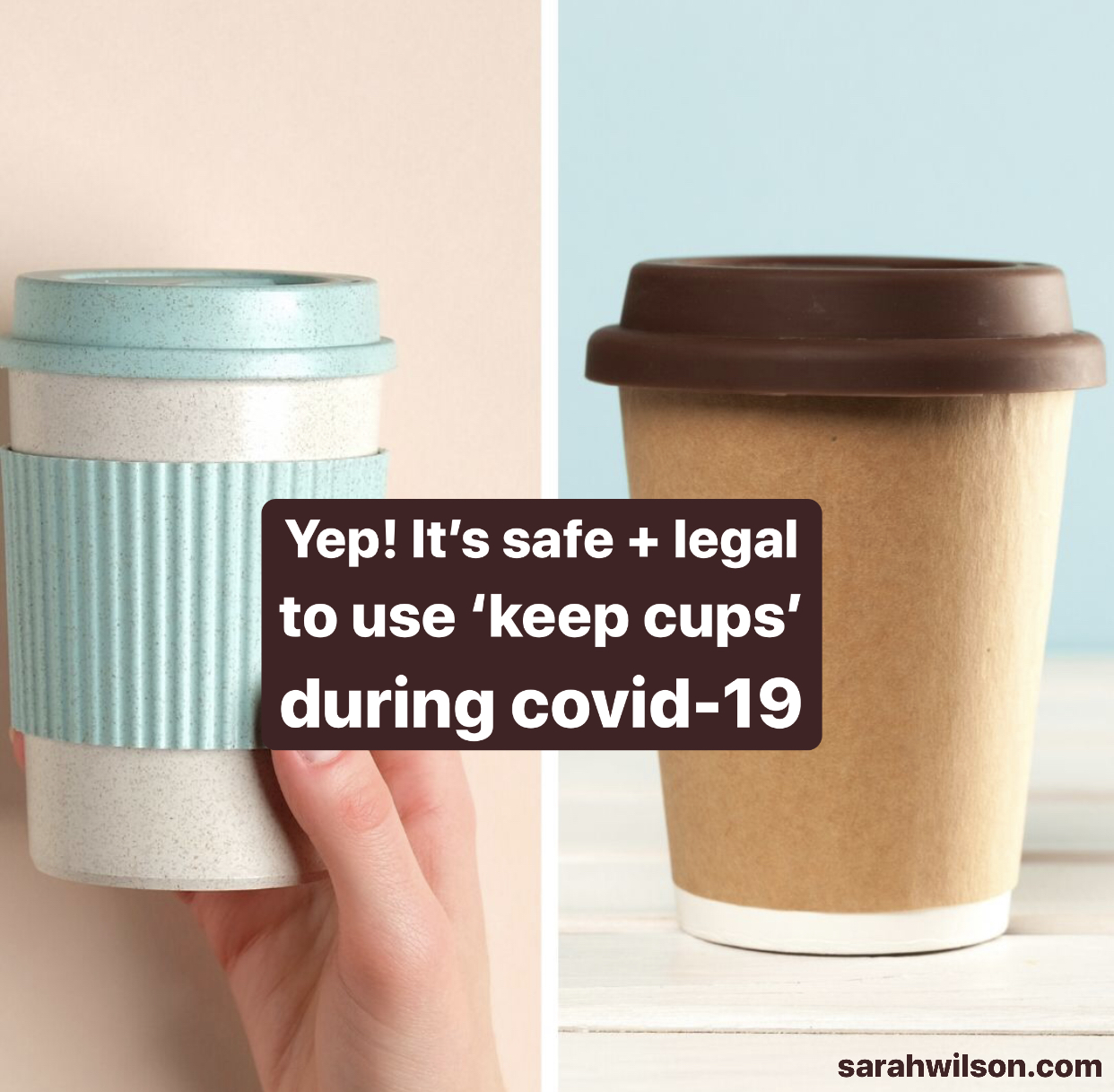Hello. This is a post I wrote to help coffee drinkers and cafe owners navigating the HUGE misconception that, “You can’t use reusable, or BYO, cups during Covid”.
Fact is: you can.
So why is everyone saying you can’t? Same reason that everyone panic-bought toilet paper…because everyone else panic-bought toilet paper.
Time to bust this myth apart and do better, don’t you reckon? Here in my ‘hood, Bondi, I’m running a Bondi Says F*ck the Cup campaign with a bunch of passionate locals who spot the hypocrisy of caring about our ocean on our front doorstep while contributing to it’s destruction. You can follow us on @BYOCupWeek on the IGs.
I’ve updated this post over recent weeks as Sydney goes into another Covid lockdown. The short version of things:
- Reusable cups, or BYO cups, at cafes during Covid lockdowns – or any other time – are not illegal.
- The science says: Reusable cups are as safe as single-use during a Covid outbreak – or any other time.
The problem
Around the globe cafes are not able to serve coffee-to-stay during Covid outbreaks, but have interpreted the regulations to mean they can’t serve takeaway coffee in a cup you bring from home. The impression everyone has (from what I can gather) is that there is risk entailed, or that it’s illegal to use/serve them.
But, here’s the thing: we also have a climate and plastic crisis going on. And it’s bothering most people I know that, “No one is doing anything”. Single-use cups have long been a highly visual symbol of our throw-away mentality. And I think “covid-clarity” has got us gagging to address many of our mindless lifestyle habits, as well as the bigger crisis that looms – the climate emergency.

- In my suburb alone 75,000 single-use cups go into landfill every week!!
- 2.7 million go into landfill every day in Australia.
- Them cups take 400 years minimum to break down.
- Meanwhile, we are ingesting a credit card-sized amount of plastic every week (from the water and food we consume).
Also:
Here’s a rundown of why disposable cups are such an issue. And as most of you know, they are no longer being recylced.
Also, here’s a rundown of why the biodegradable and compostable ones are just as bad for the environment.
I took a look around at the science, the law and what’s been done elsewhere regarding sensible solutions. I reached out to Australian federal and state environment departments. Several indicated interest in pursuing but then went MIA; Victoria Health has provided some great information, see below.
BYO cups are not illegal during Covid
That is, it ain’t illegal anywhere in Australia. I chased up with both the Federal Health and Environment Ministers Greg Hunt Sussan Ley.
Federal Environment minister Sussan Ley came back to me with additional advice from Health Minister Greg Hunt’s office.
The full statement is below. Ley and Hunt’s replies confirm there is no restriction on the use of “keep cups”, and that there is no science that says they are any riskier than disposable cups. They do, understandably, remind us to respect cafe owner’s choices. however.
The Victorian Government have put out a helpful fact sheet. See full article here. They make this point.
“There is currently no evidence to suggest there is any benefit in switching to disposables.”
Various councils have put out some information to clarify the BYO Cups are fine message, like this Ballina Shire Council factsheet.
BYO cups are not illegal during Covid
That is, it ain’t illegal anywhere in Australia. I chased up with both the Federal Health and Environment Ministers Greg Hunt Sussan Ley.
Federal Environment minister Sussan Ley came back to me with additional advice from Health Minister Greg Hunt’s office.
The full statement is below. Ley and Hunt’s replies confirm there is no restriction on the use of “keep cups”, and that there is no science that says they are any riskier than disposable cups. They do, understandably, remind us to respect cafe owner’s choices. however.
The Victorian Government have put out a helpful fact sheet. See full article here. They make this point.
“There is currently no evidence to suggest there is any benefit in switching to disposables.”
The science says single-use is Covid-safe
Nearly 130 scientists, academics, and doctors from 19 countries signed onto a statement in June 2020 reassuring retailers and consumers that reusable systems can be utilized safely during the pandemic by employing basic hygiene. You can read more here.
In the US Cameron Wolfe, a professor of medicine in the division of infectious diseases at Duke University, told the Wall Street Journal, “It’s an incredibly low likelihood that [a resusable] cup would be the primary vehicle for transmission to occur.”
But doesn’t Covid-19 last longer on glass than paper? That is possible. But disposable cups are plastic coated, in the main. Unless you are talking about the medical-grade stuff, there is nothing intrinsically sanitary about plastic. Pathogenic bacteria and viruses will all lurk there just as happily as anywhere else. They can sit on the product inside the plastic, they can sit on the plastic itself.
In fact, a study from the New England Medical Journal indicates that COVID-19 can survive on plastic surfaces for two to three days, and on cardboard for 24 hours.
Besides, it’s kind of a moot point. In the barista-to-customer transaction, the cup is touched within a timeframe of a few minutes.
Plus, remember, Covid is an airborne virus!
As the Center for Disease Control and Prevention in the USA tells us, it’s very unlikely that you can catch COVID-19 from food and its packaging.
The best measure to prevent infection via your takeaway coffee interaction is the usual – wash hands, keep your distance etc.
How cafes can be safe: The Contactless Pour
Of course, many café owners want to employ extra measures to keep their staff safe. Afterall, they can’t control what you’ve done with your cup between the washing up pile and the café (albeit just as you can’t control what the café staff has done with a paper cup in the past day or two; in the final wash-up, this is a mutual obligation exercise!).
Here’s how to do the contactless pour:
Customer puts super clean re-usable cup from home is put on the counter. Customer holds onto their lid. Each cafe just needs to find a good counter space for this play out. It’s worth doing! Just move that cake stand of croissants a little to the left!
Next the barista pours the shot and the milk in to the customer’s cup direct…
….customer puts their lid on and takes their coffee home!
Responsible Cafes has a video here to show how to do this safely.
Or you can keep using your Mug Library. Why not?
Just ensure there’s second container/basket for customers to put their used mugs in
You can also use a cup swap scheme like Huskee Swap.
You can read about Huskee Swap here. Basically, the customer buys the cup and returns it when they go to next buy their coffee from their local café; the café commercially washes the cup and makes the customer’s new coffee in a fresh, sanitised cup.
We are doing this scheme for our #BYOCupWeek. Responsible Cafes has a great video to show how easy and streamlined the system is here. If you’re a café owner, you can register your cafe here, purchase cups from here and use the code ResponsibleCafes50 for a 50% discount.
At the very least, you can always go topless
The lids are an eco tragedy. Plus, they contain BPA, a known endocrine disruptor (linked to breast and prostate cancer, early puberty, obesity, autism, and fertility issues) and are banned in many other products.
It really is easy to say ‘no’ to one and, if you’re a café, you can ask customers if they actually want one before handing over their coffee, yeah?
Cath at CatfishCreates has done up a poster of me topless, wearing my green shorts and glasses, that you can hang at your local coffee machine if you think it might help! Lord forbid.
PS here’s the Minister’s full statement:
(And I have to say I’m impressed both Ministers Ley and Hunt took my enquiry seriously.)
COVID 19 hasn’t taken away the need to reduce waste and increase recycling.
I’m all for keep cups and it would be good to see them back more widely at the right time, but we also need to respect the pressures that small businesses like coffee shop owners and their staff will be under at present.
The current advice remains that the virus can live on surfaces for hours or days so we need to be careful.
If your coffee shop can accommodate your very clean keep cup as restrictions ease then that is worth discussing
Respect where they are for the moment either way though and commit to making a permanent change to keep cups when restrictions are removed.
At this time we need to respect the pressures that small businesses like coffee shop owners and their staff will be under at this time, while also remaining conscious of the problems disposable coffee cups present for the environment.
Work with your coffee shop owner where they are in a position to accommodate and keep your cup cleaner than ever.
Respect where they are for the moment either way and commit to a permanent change to keep cups when restrictions are removed.
Background advice we have from health.
There is no specific advice from the Department of Health in relation to the use of reusable coffee cups during the COVID-19 pandemic. It is noted that many cafes and restaurants have made the decision not to use such reusable coffee cups at this time.
This is an individual decision of such businesses, and it is likely that it is one of the steps they may have taken to maintain sound hygiene standards and reduce the risk of transmission of COVID-19 to their staff and customers.
The decision was likely made in the context of evidence that the virus can survive on different surfaces for hours to days, and therefore, as a preventive measure to attempt to reduce virus transmission.
The rationale underpinning the use of reusable cups from an environmental perspective as a means to reduce landfill from disposable cups remains sound, and businesses may resume accepting reusable cups when the COVID-19 situation improves, at their discretion.
Hope all this helps…as I say, please do share this post around and use the information to have a chat to your local cafe crew. We can start taking action. Even small actions. For action begets action.



